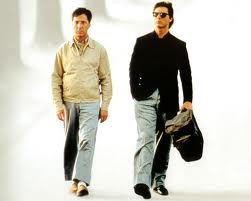TRAVIS WEAGANT
<Editor-In-Chief>
On January 11, some of my wisdom was lost, which I can only assume will make me more unreasonable. It was taken directly out of my jaw. Being subsequently barred from physical exertion for a few days, I took to the couch, where painkillers and movies awaited. There were complications following the procedure, the most significant of which was the cab driver bringing me to the corner of York and University instead of to York University. This earned him a string of expletives that he did not understand because I could only control half of my mouth. When I finally returned home, I climbed into bed and began a three-day odyssey in film. What follows is the drug-addled account of that journey.
Film #1: This is 40
 Even T3s couldn’t make this funny. No Apatow comedy should have a running time over 120 minutes. This one ran 133. The only time I wasn’t bored was during Melissa McCarthy’s hysterical tirade in a principal’s office. That was funny. An unhappy couple worrying about money, their children, and getting old isn’t. It’s boring.
Even T3s couldn’t make this funny. No Apatow comedy should have a running time over 120 minutes. This one ran 133. The only time I wasn’t bored was during Melissa McCarthy’s hysterical tirade in a principal’s office. That was funny. An unhappy couple worrying about money, their children, and getting old isn’t. It’s boring.
Film #2: The Campaign
This is where I gave up on comedy for the weekend. Maybe it’s because the freezing was wearing off, making chuckles painful, but I didn’t laugh out loud once during The Campaign. Most of the humour from Zach Galafianakis’ character, Marty Huggins, stems from the fact that he is a few credits short of a courseload, which just wasn’t that funny because I already saw him in The Hangover. Longing for his father’s approval, Huggins accepts a nomination to run for Congress in a small southern town against incumbent Cam Brady (Will Ferrell). Ferrell plays an arrogant, womanizing blowhard, who just wasn’t that funny because I already saw him in Anchorman. I sincerely regret spending even one intoxicated minute watching this.
Film #3: Zero Dark Thirty
Maybe it’s because the first two films were so bad, but Zero Dark Thirty may have stolen the weekend. Director Kathryn Bigelow’s The Hurt Locker underwhelmed me a couple of years ago. I found it long and boring. Zero Dark Thirty, however, is exactly what I expected: a topical spy thriller from a brilliant director that engrosses the viewer from start to finish. Bigelow would not have been able to justify the almost-three hour runtime for an entirely fictional spy story, but the story of the biggest manhunt in history evokes an insatiable curiosity in the viewer that glues them to the screen.
 I’ve read several criticisms of the film as an apology for torture, including one by The Guardian’s Naomi Wolf, who worryingly suggests that such a sin is somehow made worse because Bigelow is a woman. I do agree that the film should not hold itself out as even a partially factual account of the events portrayed therein (perhaps “inspired by a true story” is an appropriate tagline). There is simply no way for the average viewer to evaluate the film’s accuracy. However, the film focuses on characters who torture people as a means to obtain information. Like any bureaucrat, an intelligence officer always believes in his or her own self-importance. For them to believe otherwise would undermine their performance. Does it not make sense for such a character, as an artistic creation, to extol the virtues of torture and bemoan its prohibition? It seems to me that for the character do otherwise would undermine the film’s realism.
I’ve read several criticisms of the film as an apology for torture, including one by The Guardian’s Naomi Wolf, who worryingly suggests that such a sin is somehow made worse because Bigelow is a woman. I do agree that the film should not hold itself out as even a partially factual account of the events portrayed therein (perhaps “inspired by a true story” is an appropriate tagline). There is simply no way for the average viewer to evaluate the film’s accuracy. However, the film focuses on characters who torture people as a means to obtain information. Like any bureaucrat, an intelligence officer always believes in his or her own self-importance. For them to believe otherwise would undermine their performance. Does it not make sense for such a character, as an artistic creation, to extol the virtues of torture and bemoan its prohibition? It seems to me that for the character do otherwise would undermine the film’s realism.
Let us not forget that good art does not advocate a position; it merely puts it on display. Nineteen Eighty-Four never, as a work of art, advocated against totalitarianism. Characters within the work attempted to subvert it, certainly, but the work itself was not an opinion. The perspective of the reader is what truly determines whether Winston’s life is perceived as destructive or heroic. It does not occur to those of us who perceive Winston as a hero that there may be those who perceive him as an anti-hero, and when it does, such a realization makes us uncomfortable. Likewise, Zero Dark Thirty reminds Naomi Wolf that, at one time, powerful American officials, both elected and appointed, found torture to be an acceptable means of interrogation. Confronted by the spectre of those who disagree with her on a contentious moral issue, Wolf gets all upset and shoots the messenger. Oh dear.
Film #4: Rain Man
One year before I was born, this film won the Oscar for Best Picture. Dustin Hoffman also won Best Actor for his portrayal of Raymond Babbitt, an autistic man who helps his brother Charlie (Tom Cruise) become a better person. I enjoyed Rain Man so much, I even paused it while I took my painkiller-mandated nap. I have had the pleasure to know people with varying degrees of autism throughout my life, and Hoffman’s performance demonstrates the total mastery of his craft. He was fascinating to watch.
I now turn to the soundtrack. While the pop music song selections were outstanding, Hans Zimmer’s original score seems to have been composed for another film. The haunting principal theme, which recurs every time Cruise and Hoffman take to the road in their father’s Buick, interrupts the flow of the film and seems at odds with what is happening onscreen. Full disclosure: I really don’t like Hans Zimmer. I haven’t liked him since high school, so this particular encounter with his work is probably confirmation bias, especially since he won the Oscar for Best Original Score for Rain Man.
Film #5: O Brother, Where Art Thou?
Coen Brothers + prescription drugs = big mistake. The Coens’ films are hit and miss for me. Call me blasphemous, but I didn’t like The Big Lebowski. On the other hand, The Ladykillers was fantastic. One thing all these films have in common is surrealism. O Brother, Where Art Thou? is an adaptation of Homer’s Odyssey set during the Great Depression in Mississippi. Unfortunately, I am completely unfamiliar with the Greek epic, so the film appeared even more surreal. Apparently John Goodman’s character is the Cyclops. I was so befuddled that I took a voluntary nap and returned to the film later.
Confusion aside, the photography is stunning and the music well deserving of its 2001 Grammy. Of particular note is the scene where the three protagonists stumble upon a Ku Klux Klan gathering and dress up as the “colour guard” to save their guitar-playing friend from lynching. Also, the gubernatorial campaign in this film is much funnier than The Campaign.
Alcoholism has been addressed repeatedly on television and in film, but usually only incidentally to the main plot. Flight is a film about addiction. Within the first 20 minutes, Denzel Washington has already saved the plane from crashing. The remaining two hours are dedicated to his acceptance of responsibility for saving the plane while drunk and high. Or maybe he was just drunk, and I was high. This one’s fuzzy.
Film #7: Lincoln
It’s true what they’re saying about Daniel Day-Lewis. I have no idea what Abraham Lincoln was like as a person, but, after this film,  Day-Lewis’ interpretation will be the dominant perception of the 16th President in the popular imagination. However, the most interesting character is not the eponymous President, but the radical Republican Thaddeus Stevens (Tommy Lee Jones). While Lincoln’s moderate Republicans argued for the abolition of slavery as a means to end the Civil War, Stevens’ radicals advocated true race equality, a concept unpalatable to the majority of Congress at the time.
Day-Lewis’ interpretation will be the dominant perception of the 16th President in the popular imagination. However, the most interesting character is not the eponymous President, but the radical Republican Thaddeus Stevens (Tommy Lee Jones). While Lincoln’s moderate Republicans argued for the abolition of slavery as a means to end the Civil War, Stevens’ radicals advocated true race equality, a concept unpalatable to the majority of Congress at the time.
The defining moment of the film is when Stevens stands before Congress and publicly compromises his ideal of total race equality for the practical objective of achieving equality before the law. It begs the question: how often do our own elected representatives say things they do not believe and sacrifice their own integrity for a piecemeal step toward their ultimate goal?
Anthony Hopkins is always a pleasure to watch, even if you sleep through most of his performance. This film is about the making of Alfred Hitchcock’s most famous work: Psycho. I have never seen Psycho, so I approached this film with no knowledge of its characters or plot. Nonetheless, Hopkins and Helen Mirren (as Hitchcock’s wife, Alma Reville) create fascinating characters and director Sacha Gervasi tells a compelling story.
Though I have read online that the overarching love story between Hitchcock and Reville is somewhat revisionist (Hitchcock’s penchant for the actresses he worked with is apparently well-known), the script is dry and amusing. At 105 minutes, this is a bite-sized film worth seeing.
Well, there you have it. I’ve done my best to remember details, but there are moments from the last three days that I will never regain. Please take the above reviews with a grain of salt (or perhaps a salt-water rinse), as their accuracy is not guaranteed unless the viewer is under the influence.

